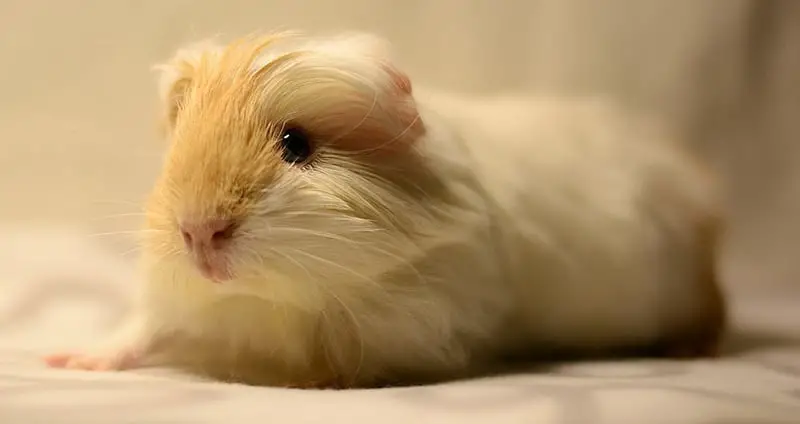On average, wild guinea pigs tend to live between 3 and 5 years, while guinea pigs in captivity most commonly live to be between 5 and 8 years old! This range of lifespans can vary, though, based on factors such as the type of guinea pig, the daily care that they receive, and a healthy amount of luck.
As the owner of an adorable guinea pig, it makes sense that you’d want to be aware of their lifespan. Knowing the lifespan of a guinea pig allows you to make more informed and appropriate decisions regarding their medical care and behavioral issues that may arise in your pet.
Since guinea pigs are so entertaining and loving, you’d clearly want them to live for as long as possible. Fortunately, there are several things that you can do to increase the chances of your guinea pig living a long and healthy life. This post will review some important information regarding guinea pig health and care strategies to prolong their lives.
Table of Contents
How Long Can A Guinea Pig Live
This question is simply answered by looking at guinea pigs that have managed to live beyond their life expectancy. While it’s most common to see captive guinea pigs living to be around 7 years old, the oldest recorded guinea pig lived to be over 14 years and 10 months old!
A clear fact is that guinea pigs that are kept in captivity will almost always live longer than wild guinea pigs that have to care for themselves. This decently large gap in life expectancy is attributed to a captive guinea pig’s consistently healthy diet, environment that’s safe and relaxing, and protection from disease and predators. When these factors are combined, they often help a guinea pig live for many years.
It’s difficult to say exactly what makes a guinea pig live to be more than twice its expected age. Any guinea pig lifespan outliers are likely due to a combination of excellent care, impeccable genetics, and a healthy amount of luck. While luck is obviously a factor that’s out of your control, you can definitely purchase a guinea pig with great genetics and give that guinea pig the exact care that they require.
So, there are several actionable things that you can do to give your guinea pig the best chance of living a long life.
Why Do Some Guinea Pigs Live So Long?
As previously stated, there isn’t an exact answer as to how some guinea pigs manage to live for such a long time. However, it can generally be boiled down to two basic concepts, which are great care and clean genetics. Both of these factors are controllable in some way.
If you’re in possession of a “healthy” guinea pig, also known as a guinea pig that has a family history that’s problem-free, then they have a greater chance of living beyond their expected lifespan. It’s important to remember that it’s the medical issues that come with old age that end lives — not the old age itself.
So, if you’re able to make sure that the guinea pig you’re getting has a lower chance of developing a health problem, there’s a good chance that they’ll live longer than average.
The diet of a guinea pig also plays a large role in their overall health. If a guinea pig has access to a diet that provides them with their essential nutrients, then their bodies will be able to grow strong and fight off illnesses. Stronger guinea pigs will be able to defend themselves against whatever life has to throw at them.
Additionally, the environment that your guinea pig lives in plays a large factor in their lifespan. Guinea pigs that live in safe, stress-free, comfortable environments tend to be much healthier and live significantly longer.
Therefore, if a guinea pig lives beyond their expected lifespan, it’s likely because they had a great diet, strong genetics, and an optimal environment. The good genetics will be considered when purchasing your guinea pig, and the diet and environment come after purchasing.
How To Buy A Healthy Guinea Pig
If you’re set on owning a guinea pig that will live for many years, then your best option is to purchase a guinea pig that comes from a very strong and healthy family. Living creatures are heavily influenced by their genetics, and the creatures that come from healthier families generally tend to live longer on average.
So how does one go about purchasing a genetically-sound guinea pig. It all comes down to finding a reputable, experienced breeder. When you purchase a guinea pig from a pet store, you aren’t able to see the health records of a guinea pig’s predecessors. Making a purchase like this is fine, but it’s essentially taking a gamble on the health of your guinea pig.
However, it isn’t as simple and straight-forward as finding a breeder that’s been in business for many years. This breeder also needs to keep detailed records of their guinea pigs’ behaviors and ailments and keeps their guinea pigs until they’re grown. Many guinea pig ailments only become visible once they reach adulthood, so breeders that sell their animals before they reach this stage will never be aware of genetic issues in their guinea pigs.
The breed of guinea pig doesn’t come into play too much. Skinny pigs generally live a bit longer at 6 to 9 years while long-haired guinea pigs live about 5 or 6 years. Many guinea pigs are simply mixes of other species, so lifespan has become quite consistent between species.
While the guinea pigs that come from healthy families can definitely still experience health issues, the chances of these issues developing are significantly reduced.
Tips For Increasing Your Guinea Pig’s Lifespan
Since you likely want to keep your guinea pig alive for as long as possible, what are some actionable ways to increase their lifespan? While there isn’t a guaranteed way to get your guinea pig to live longer than average, there are several things that you can do to give them the best chance of doing so.
To begin with, if you have yet to purchase your guinea pig, you need to look for a breeder that keeps detailed records of their guinea pigs’ health. When your cavy comes from a healthy line, there’s a great chance that they’ll be very healthy as well.
After purchasing your guinea pig, you absolutely must feed them a diet that aligns with their specific dietary needs. Guinea pigs need to eat certain foods and take in specific nutrients in order to grow strong and remain healthy throughout their lives. This is done with a healthy mixture of guinea pig pellets, a high-quality hay, and some occasional treats. It’s always a smart idea to get the highest-quality food possible due to its large impact on a guinea pig’s health and well-being.
Your guinea pig’s environment is also a factor that needs to be considered. Many owners are surprised at just how much a clean and safe environment benefits their guinea pigs. You absolutely need a cage that’s large enough for your guinea pigs to go about their daily activities, and then you must accessorize the cage to meet their needs. Keep this cage in a location in your house that gets medium amounts of traffic and is kept at a consistent temperature.
In addition to all of those points, it also helps to spend time with your guinea pigs every single day! Keeping them active and happy will do wonders for increasing the lifespan of your guinea pigs.

